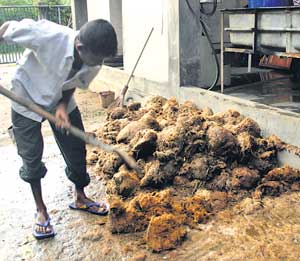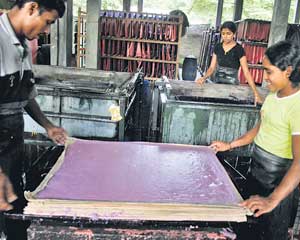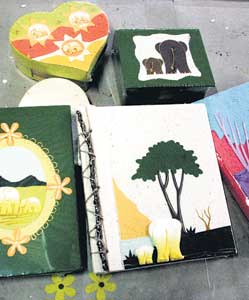
On the elephant trail
Following the footprints of Asia’s majestic beast, Thusitha Ranasinghe, founder of Eco Maximus will be collecting elephant dung from intense human – elephant conflict areas to be turned into paper and sent to over 10 countries around the world. Eco Maximus is venturing into Dambulla trying to add economic value to the animal which is regarded as a pest and detested in the area. “Dung from the elephants used in elephant safaris in Habarana will be used,” Ranasinghe, who is also the Managing Director of Eco Maximus, told The Sunday Times FT, adding that they will also look at buying droppings of wild elephants that can be collected from the jungles by the villagers.
The main production plant of the company is located in Kegalle – near the Pinnawela Elephant Orphanage and adjoining the Millennium Elephant Foundation while another smaller plant is maintained inside the Eco Park of the Kandalama Hotel. Ranasinghe said that the new plant coming up in Dambulla will hopefully match the production in Kegalle. Eco Maximus derives its name from the scientific name of the elephant Elephas maximus and was initially set up to recycle waste printing paper but started manufacturing elephant dung paper after realizing it was perfect material for paper manufacture. The rest as they say is history. “We’re trying to add economic value to the elephant,” Ranasinghe said adding that villagers in the area around the new plant detest elephants because they destroy the homes and livelihoods of the villagers. “These people are affected very intensely by elephants and we are putting ourselves directly on the firing line,” Ranasinghe said, adding that they want to create a value perception about elephants in these villages. The perception of the animal has to change and the people who are constantly suffering from the ravages of the elephant.
Speaking of the production, he said that an adult elephant generally consumes about 150 kg – 180 kg of food a day and it takes about 10 – 12 adults to produce one ton of dung. A 100 – 120 sheets of paper that can be cut into four A4 size sheets can be made out of 10 kg of elephant dung while daily output at the Kegalle factory is around 3000 sheets of paper. Apart from elephant dung, Eco Maximus also manufactures paper using banana, cinnamon and paddy husk which are part of the natural range. “No virgin pulp, toxic dyes or chemicals are used in the manufacturing process,” he said.
|
|
||
| || Front
Page | News
| Editorial
| Columns
| Sports
| Plus
| Financial
Times | International
| Mirror
| TV
Times | Funday Times || |
| |
Reproduction of articles permitted when used without any alterations to contents and the source. |
© Copyright
2007 | Wijeya
Newspapers Ltd.Colombo. Sri Lanka. All Rights Reserved. |


